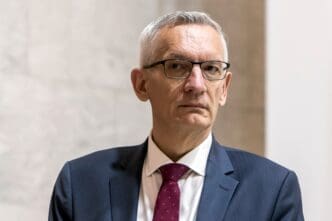Executive Summary
- Germany’s foreign intelligence chief, Martin Jaeger, warns that Russia poses a direct and immediate threat to the European Union, with the potential for “heated confrontation” and a willingness for direct military engagement with NATO.
- Germany is considered Russia’s “number one target in Europe” due to its status as the largest EU country and a leading supporter of Ukraine.
- Russia is actively engaged in hybrid warfare, employing tactics like election manipulation, propaganda, espionage, sabotage, and cyberattacks to destabilize European democracies and undermine the NATO alliance.
The Story So Far
- Germany’s intelligence chiefs are issuing stark warnings because Russia is determined to expand its sphere of influence westward into Europe, viewing Germany as a primary target, and is willing to engage NATO directly. This immediate and ongoing threat is already manifesting through various hybrid warfare tactics, including election manipulation, propaganda, disinformation, espionage, sabotage, and airspace violations, all designed to destabilize European democracies and undermine the NATO alliance.
Why This Matters
- Germany’s intelligence chiefs warn that Russia poses an immediate and direct threat to the European Union, signaling a heightened risk of “heated confrontation” and potential military engagement with NATO, rather than a distant future possibility. This assessment underscores that Russia’s ongoing hybrid warfare tactics, including espionage, sabotage, and disinformation, are actively aimed at destabilizing European democracies and undermining the NATO alliance, with Germany identified as a primary target.
Who Thinks What?
- Germany’s foreign intelligence chief, Martin Jaeger, warns that Russia poses a direct and immediate threat to the European Union, aiming to expand its influence westward and willing to engage militarily with NATO, viewing Germany as its primary target.
- The president of the German domestic intelligence service (BfV), Sinan Selen, corroborates that Russia presents an “increasingly escalatory” hybrid threat to Germany and its allies, employing espionage, disinformation, interference, sabotage, and cyberattacks to destabilize liberal democracies.
Germany’s foreign intelligence chief, Martin Jaeger, issued a stark warning on Monday, stating that Russia poses a direct and immediate threat to the European Union, with the current “icy peace” potentially escalating into “heated confrontation” at any moment. Speaking to lawmakers in Berlin, Jaeger emphasized Russia’s determination to expand its sphere of influence westward into Europe, indicating a willingness for direct military engagement with NATO if deemed necessary.
Russia’s Western Ambitions
Jaeger, who assumed his role last month, underscored Russia’s strategic objective to expand its influence across Europe. He cautioned that Moscow would not hesitate to engage in direct military confrontation with NATO to achieve this aim.
Germany, as the largest EU country and a leading supporter of Ukraine, is considered Russia’s “number one target in Europe,” according to Jaeger. This assessment highlights the heightened risk faced by the nation.
These warnings follow a series of recent incidents across the EU, including alleged Russian drone incursions into Polish airspace and violations of Estonian airspace by Russian fighter jets. Germany itself suspects Russia of being behind several drone incidents, such as those that disrupted operations at Munich Airport, alongside sabotage and disinformation campaigns.
Immediate Threats and Hybrid Warfare
Echoing other intelligence chiefs, Jaeger, previously Germany’s ambassador to Kyiv, stressed that Russian ambitions extend beyond the conflict in Ukraine. He dismissed earlier assessments, stating, “We must not sit back and assume that a possible Russian attack would come in 2029 at the earliest; we are already under fire today.”
Moscow, he explained, appears intent on undermining the NATO alliance and destabilizing European democracies. This is pursued through well-known means, including election manipulation, propaganda, disinformation, espionage, sabotage, airspace violations, and the persecution of opposition figures abroad.
Sinan Selen, president of the German domestic intelligence service (BfV), corroborated these concerns, highlighting the potential “hybrid threat” posed by Russia to Germany and its allies. He described Russia’s conduct as “increasingly escalatory,” continuously adjusting its activities to weaken liberal democracies.
Selen noted a wide range of Russian espionage, disinformation, interference, sabotage, and cyberattacks detected in Germany. Jaeger added that his agency has observed a clear increase in attempts by foreign powers to influence German domestic politics, though Russian operations are designed to be highly difficult to trace and attribute.
Ongoing Confrontation
The unified message from Germany’s top intelligence officials underscores the immediate and multifaceted nature of the Russian threat to European security. Their warnings emphasize that the confrontation is ongoing, manifesting through hybrid tactics aimed at destabilizing the EU and its democratic institutions.








